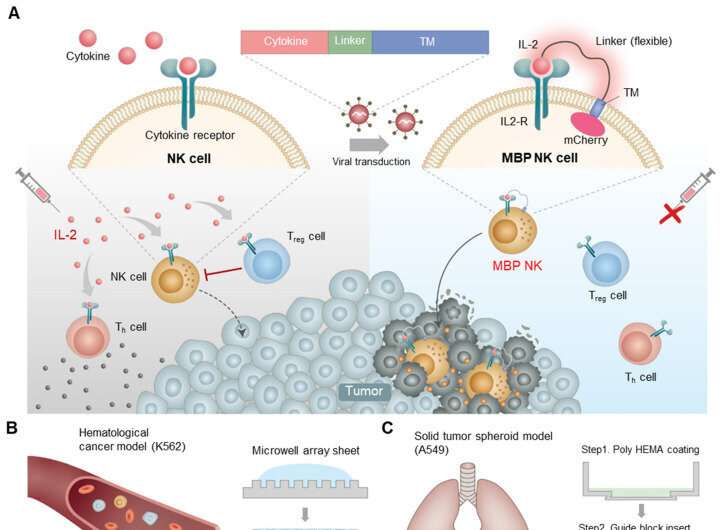This article has been reviewed according to Science X's editorial process and policies. Editors have highlighted the following attributes while ensuring the content's credibility:
fact-checked
proofread
A new natural killer cell therapy product with promising anticancer effects

A research team led by New Biology Professor Minseok Kim at the DGIST has developed a natural killer (NK) cell therapy product, which can self-activate with CT Cells. This new product has overcome the drawbacks of existing therapy products, such as short in vivo survival and low activity. Using this technology is expected to treat various types of cancer in the future.
Being the most fatal disease with increasing incidence rates worldwide, cancer brings several problems, such as pain and high treatment costs. With the recent successful entry of chimeric antigen receptor T in the market, "immune cell therapy" has been gaining attention. This therapy has few side effects and high curative value unlike existing anticancer drugs. However, it is difficult to apply to actual treatments due to several limitations.
Therefore, Professor Minseok Kim's team developed a novel therapy using NK cells. Previously, cytokines were mostly injected from the outside to maintain the activity and persistence of NK cells. However, these cytokines used to affect other immune cells, deteriorating the function of NK cells or causing various side effects.
Professor Minseok Kim's team created NK cells with membrane-bound proteins (MBP) that can self-activate to solve these problems. The cytokines necessary for survival and activity are attached to the cell membrane to increase in vivo survival and maintain activity, which could solve the problems of the existing NK cell therapy. Moreover, preclinical trials have proved that the secretion of cytolytic proteins, such as perforin, increased due to this therapy, and antitumor and anticancer effects improved.
Professor Minseok Kim said, "The MBP NK technology that overcomes the limitations of existing NK cell therapies is significant as a new approach that can minimize side effects while increasing self-activity and survival." Further, "since it showed great penetration concerning solid tumors, it can hopefully extend into platform technology that can be applied to all kinds of solid cancers in the future."
This study was conducted with the help of the National Research Foundation of Korea's biomedical technology development project and the Korea Health Industry Development Institute's health technology R&D project. The paper was featured on the cover of April's issue of Theranostics.
More information: Hyun Young Shin et al, Cytokine engineered NK-92 therapy to improve persistence and anti-tumor activity, Theranostics (2023). DOI: 10.7150/thno.79942



















